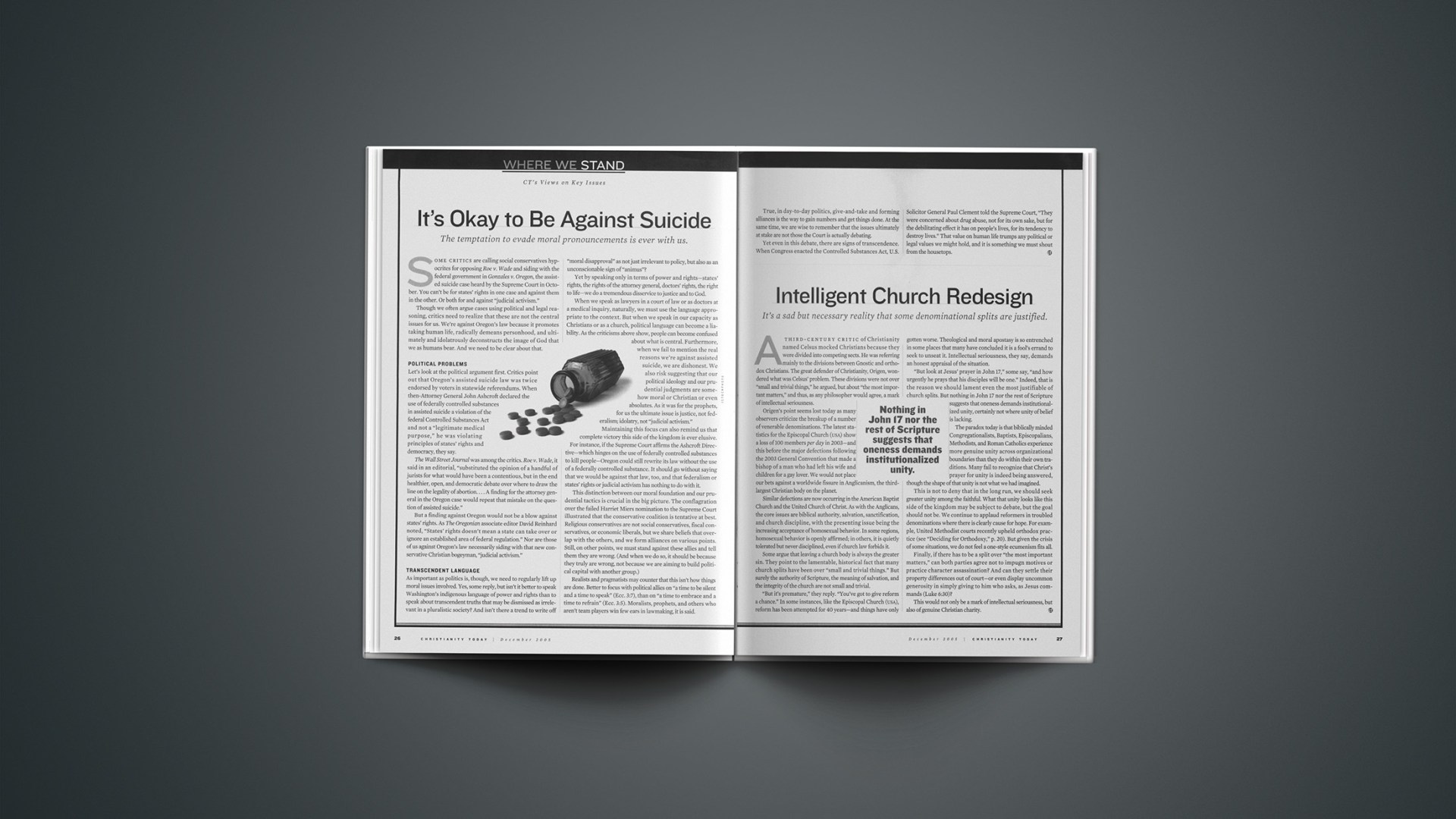| • |
Some critics are calling social conservatives hypocrites for opposing Roe v. Wade and siding with the federal government in Gonzales v. Oregon, the assisted suicide case heard by the Supreme Court in October. You can’t be for states’ rights in one case and against them in the other. Or both for and against “judicial activism.”
Though we often argue cases using political and legal reasoning, critics need to realize that these are not the central issues for us. We’re against Oregon’s law because it promotes taking human life, radically demeans personhood, and ultimately and idolatrously deconstructs the image of God that we as humans bear. And we need to be clear about that.
Political Problems
Let’s look at the political argument first. Critics point out that Oregon’s assisted suicide law was twice endorsed by voters in statewide referendums. When then-Attorney General John Ashcroft declared the use of federally controlled substances in assisted suicide a violation of the federal Controlled Substances Act and not a “legitimate medical purpose,” he was violating principles of states’ rights and democracy, they say.
The Wall Street Journal was among the critics. Roe v. Wade, it said in an editorial, “substituted the opinion of a handful of jurists for what would have been a contentious, but in the end healthier, open, and democratic debate over where to draw the line on the legality of abortion. … A finding for the attorney general in the Oregon case would repeat that mistake on the question of assisted suicide.”
But a finding against Oregon would not be a blow against states’ rights. As The Oregonian associate editor David Reinhard noted, “States’ rights doesn’t mean a state can take over or ignore an established area of federal regulation.” Nor are those of us against Oregon’s law necessarily siding with that new conservative Christian bogeyman, “judicial activism.”
Transcendent Language
As important as politics is, though, we need to regularly lift up moral issues involved. Yes, some reply, but isn’t it better to speak Washington’s indigenous language of power and rights than to speak about transcendent truths that may be dismissed as irrelevant in a pluralistic society? And isn’t there a trend to write off “moral disapproval” as not just irrelevant to policy, but also as an unconscionable sign of “animus”?
Yet by speaking only in terms of power and rights—states’ rights, the rights of the attorney general, doctors’ rights, the right to life—we do a tremendous disservice to justice and to God.
When we speak as lawyers in a court of law or as doctors at a medical inquiry, naturally, we must use the language appropriate to the context. But when we speak in our capacity as Christians or as a church, political language can become a liability. As the criticisms above show, people can become confused about what is central. Furthermore, when we fail to mention the real reasons we’re against assisted suicide, we are dishonest. We also risk suggesting that our political ideology and our prudential judgments are somehow moral or Christian or even absolutes. As it was for the prophets, for us the ultimate issue is justice, not federalism; idolatry, not “judicial activism.”
Maintaining this focus can also remind us that complete victory this side of the kingdom is ever elusive. For instance, if the Supreme Court affirms the Ashcroft Directive—which hinges on the use of federally controlled substances to kill people—Oregon could still rewrite its law without the use of a federally controlled substance. It should go without saying that we would be against that law, too, and that federalism or states’ rights or judicial activism has nothing to do with it.
This distinction between our moral foundation and our prudential tactics is crucial in the big picture. The conflagration over the failed Harriet Miers nomination to the Supreme Court illustrated that the conservative coalition is tentative at best. Religious conservatives are not social conservatives, fiscal conservatives, or economic liberals, but we share beliefs that overlap with the others, and we form alliances on various points. Still, on other points, we must stand against these allies and tell them they are wrong. (And when we do so, it should be because they truly are wrong, not because we are aiming to build political capital with another group.)
Realists and pragmatists may counter that this isn’t how things are done. Better to focus with political allies on “a time to be silent and a time to speak” (Ecc. 3:7), than on “a time to embrace and a time to refrain” (Ecc. 3:5). Moralists, prophets, and others who aren’t team players win few ears in lawmaking, it is said.
True, in day-to-day politics, give-and-take and forming alliances is the way to gain numbers and get things done. At the same time, we are wise to remember that the issues ultimately at stake are not those the Court is actually debating.
Yet even in this debate, there are signs of transcendence. When Congress enacted the Controlled Substances Act, U.S. Solicitor General Paul Clement told the Supreme Court, “They were concerned about drug abuse, not for its own sake, but for the debilitating effect it has on people’s lives, for its tendency to destroy lives.” That value on human life trumps any political or legal values we might hold, and it is something we must shout from the housetops.
Copyright © 2005 Christianity Today. Click for reprint information.
Related Elsewhere:
A transcript of the oral arguments is available at the Supreme Court website. The New York Times, The Washington Post, and Los Angeles Times have summaries, and the Legal Information Institute has analysis. SCOTUSBlog has predictions and background.
The Wall Street Journal and David Reinhard articles are available online.
CT’s earlier coverage of the Oregon assisted-suicide law includes:
Ashcroft’s Revenge | Challenge to suicide law gets new life. (March 16, 2005)
Death Wishes | Circuit Court supports state’s primary role in assisted suicide. (July 15, 2004)
Severe Mercy in Oregon | How two dying patients dealt with a new right: When to die. (June 14, 1999)
Lies We’ve Heard Before | The same flawed arguments that legalized abortion are now used to support physician-assisted suicide. (July 13, 1998)
Bill Would Limit Lethal Drugs | A new bill before Congress could prohibit the use of federally controlled drugs for physician-assisted suicide. But critics say the measure would restrict legitimate use of painkillers for terminally ill patients. (October 26, 1998)
What Really Died in Oregon | The state’s voter-approved suicide law represents more than an extreme belief in personal autonomy. (Jan. 12, 1998)
Doctor-Assisted Suicide Stirs Physicians’ Fears | Tremors from last month’s major medical and moral earthquake in Oregon soon will be felt across the nation. (Dec. 8, 1997)










